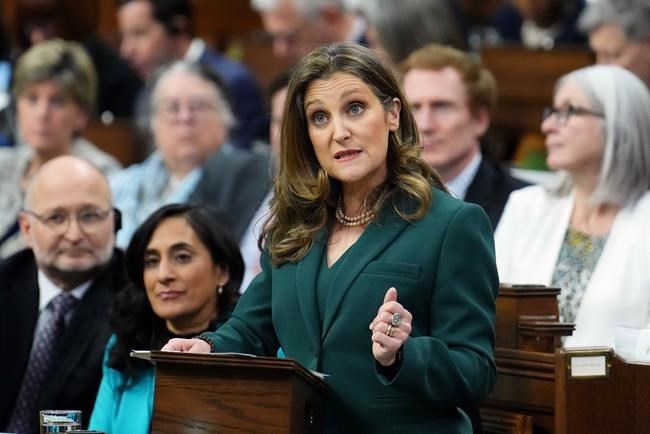OTTAWA — The federal Liberal government is committing $8.7 million to hold more consultations on Indigenous resource sharing in a budget that offers relatively little new spending on its reconciliation agenda.
On Tuesday, Finance Minister Chrystia Freeland tabled a spending plan that prioritizes Canada's transition to a greener economy, offering billions in new tax credits, as well as for health care and affordability.
Reconciliation with Indigenous Peoples remains a major priority for Prime Minister Justin Trudeau's government, with tens of billions announced in previous years, including early in his first mandate.
Major Indigenous organizations, including the Assembly of First Nations, have told the federal government that billions more are needed to address current and future infrastructure needs, such as housing.
The organization, which advocates for the needs of more than 600 First Nations across Canada, said ahead of Tuesday's spending plan that to improve on-reserve housing stock and meet population growth until 2040, about another $60 billion would be required.
"They certainly talk a good talk about reconciliation," National Chief RoseAnne Archibald said Tuesday, adding "there is a real failing" when it comes to following through on action.
She said First Nations are trapped in what she calls a "repetitive injustice" of budget cycles.
"We put forward a number of asks for funding for things like infrastructure, education and so on — and the government turns around and actually deliberately underfunds us."
Tuesday's budget shows Ottawa plans to inject $4 billion over seven years into an urban, rural and northern Indigenous housing strategy beginning in 2024-25, but that remains under development, and only $1.9 billion of the money is slated to be spent over the next five years.
The federal government also committed $8.7 million to Natural Resources Canada in the coming fiscal year to consult Indigenous partners on developing a framework to give communities access to more dollars from resource projects built on their territories.
That would fulfil a commitment made in last fall's economic statement.
Archibald says First Nations need a "new economic deal" with Ottawa — one in which communities would receive more wealth from things like resource-extraction projects, but also one in which they would benefit more broadly from the federal system and its taxation.
"All of the wealth that's built in Canada is actually built on First Nations lands and water," she said.
Asked about the government's announcement to consult on providing Indigenous communities with more access to resource revenues, Archibald says that without action, the consultation is "just more spinning of the Liberal government's wheels."
She added: "They could actually make investments that would create this new economic deal, a better economic deal for First Nations."
Archibald said this marks the second federal budget in a row since she became national chief in which Trudeau's government has "done very little to advance economic reconciliation."
Trudeau, along with his ministers of Indigenous services and Crown-Indigenous relations, often say more works needs to be done to improve the lives of Indigenous people in the country and the Liberals are committed to doing the work.
In recent years, the government has placed a greater focus on self-determination when it comes to supporting Indigenous communities, the tone of which is reflected in Tuesday's budget.
It commits to giving Indigenous Services Canada $30 million over the next five years to improve a reserve land and environment management program to ensure "First Nations can develop capacity to exercise increased responsibility over their lands, resources and environment."
Another $5 million was also pledged in the coming fiscal year for the department to take part in developing a framework for economic reconciliation in hopes of bolstering economic opportunities for Indigenous people and businesses.
The government pledged in February to put $2 billion over the next decade into an "Indigenous Health Equity Fund."
In addition to this, it promises to spend around $16 million over three years on efforts to reduce the tuberculosis rates in Inuit communities. Before Tuesday's budget was released, Inuit Tapiriit Kanatami- a national organization representing Inuit communities- had requested about $131 million over seven years for this issue.
The federal government also promised to spend $2.5 million to advance an action plan on implementing the 2019 recommendations of the National Inquiry into Murdered and Missing Indigenous Women and Girls, fulfilling one of its reconciliation-related promises to the federal New Democrats under its supply and confidence arrangement.
This report by The Canadian Press was first published March 28, 2023.
Stephanie Taylor, The Canadian Press


